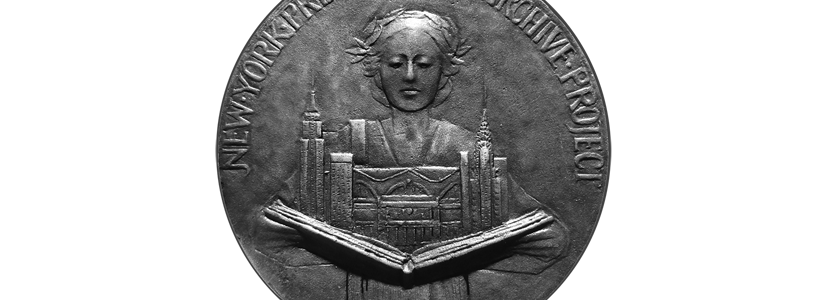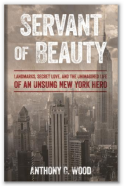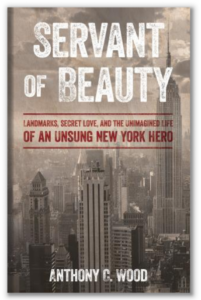
2017 Bard Birthday Breakfast Benefit
December 19, 2017
8:30-10:00 a.m.
The Yale Club
Join us in honoring two awardees who embody the preservation and curation of archives. This year we present a 2017 Preservation Award to Janet Parks for 36 years of archival stewardship as Curator of Drawings & Archives at Avery Library. A second award will honor the devotion to archival stewardship displayed by the Durst Family. The benefit will also feature a presentation by Kate Ascher on the use of archives in her writings, which include the seminal The Works: Anatomy of a City.
Since its creation two years ago, the Archive Project’s Preservation Award has honored outstanding contributions to the documentation, preservation, and celebration of the history of preservation in New York City. This year we turn our attention to those New Yorkers who exemplify archival stewardship through their work in preserving the history of preservation and New York City’s architectural and archaeological past. Archives hold our city’s stories, and without our honorees this history would be lost, moldering in dumpsters or forgotten to the public. At this year’s Bard Birthday Breakfast Benefit, join us in celebrating the work of our 2017 honorees, whose efforts have allowed New Yorkers to tell the built history of our city in perpetuity.
Award presentations and introductions will be made by author and architect Robert A.M. Stern, former NYC Park Commissioner Adrian Benepe, and J.M. Kaplan Fund Executive Director Amy Freitag.
Honor Janet Parks and the Durst Family by purchasing tickets or joining as a Benefit Co-Chair or Benefit Committee member! Join at an honorary level, or purchase a regular ticket, via PayPal by clicking below, via credit card by contacting Archive Project Executive Director Matthew Coody at 212-988-8379 or mcoody@nypap.org, or via check mailed to 174 East 80th Street, New York, NY 10075.
Lisa Ackerman
Caroline Niemczyk
Caroline Rob Zaleski
Peg Breen
Page Cowley
Joan K. Davidson
Stephen Facey
Anna B. Iacucci
Integrated Conservation Resources
Jablonski Building Conservation, Inc.
Shirley Ferguson Jenks
Thomas A. Kligerman
Teal Krasnoff
Brenda Levin
Heather Lubov, City Parks Foundation
Grant Marani & Anne Rieselbach
Elizabeth Martin & Stephen Tilly
Alan G. Neumann
Otis & Nancy Pearsall
Peter Pennoyer Architects
Theodore Prudon
Michael Ryan
Anne H. Van Ingen
Lloyd Zuckerberg
* * *
When members of the architecture and preservation fields think of archival stewardship, they think of Janet Parks. Before her retirement in June 2017, Parks held the role of Curator of Drawings & Archives at Columbia University’s Avery Architectural & Fine Arts Library for 36 years. Under her curatorial direction, the department made more than 650 acquisitions, including the Frank Lloyd Wright Foundation Archive (co-owned with the Museum of Modern Art). She has also curated exhibitions on such topics as Ely Jacques Kahn, Max Abramovitz, and the Guastavino Fireproof Construction Company. She has lectured and published on Avery’s materials and has worked with researchers from around the world.
About 95 percent of Avery Library’s more than two million archival items were acquired under Parks’s tenure, up from 50,000 items when she began. These include architectural drawings and archival photographs, correspondence, documents, and, increasingly, collections with a digital component. An architectural archive is subject to many internal and external factors, from the care the architect gave to the material, to the time between the archive’s creation and its acquisition, and the number of players involved. Working with architects, firms, and family donors, Parks selected collections for Avery that shape an archive with research and preservation impact.
Her most memorable and challenging acquisition feat was moving the Frank Lloyd Wright Foundation Archive 3,000 miles from Arizona to New York. Between 2013 and 2016 Parks spent a total of six weeks in Arizona packing the archive, which filled the equivalent of six tractor trailers. Soon after the collection made it to Avery, inquiries from around the world began to pour in, connecting the Library staff to, in Parks’s words, “an immediate fan club that wants to write to you every day.” In 2017 she was awarded a Wright Spirit Award by the Frank Lloyd Wright Conservancy for her role in moving the collection to Columbia. She was also a guest curator of Frank Lloyd Wright at 150: Unpacking the Archive, an exhibition at the Museum of Modern Art that ran through October 2017.
Avery Library’s archives reflect New York City’s rich architectural history, going beyond the canon of practicing architects to include the work of renderers, mosaicists, model makers, photographers, and preservationists. During her tenure, Parks worked with museum curators on loans of 5,000 objects to more than 270 architectural exhibitions, and she directed researchers to materials that were the archival foundation of many publications. Particularly satisfying was connecting building owners to the original drawings in the Avery collections, notably Ely Jacques Kahn, Frank Lloyd Wright, Thomas W. Lamb, and most recently the Philip Johnson drawings for the Schlumberger headquarters in Connecticut.
Summarizing such a vast collection is impossible, but two items are memorable for the role that these archival objects play in capturing the past. One of Parks’s favorite objects is a series of photographs of cast-iron buildings in SoHo, taken by Giorgio Cavaglieri and his office in 1968. Commissioned by Robert Moses and the Lower Manhattan Expressway Project with the purpose of demolishing the buildings, this survey actually served to help convince the public that this area should be designated as an historic district to block the destructive effects of the expressway.
Another favorite are the drawings of Thomas W. Lamb, a leading early 20th-century theater architect, which were retrieved from a fifth-floor dressing room at the Lyric Theater on West 42nd Street. Numbering more than 20,000 drawings, the collection contained more than just the documentary evidence of a bygone era of New York City history. Parks remembers prying open a tightly-sealed metal tube that held a set of drawings: “The smell of cologne and pipe tobacco wafted out. It had been trapped inside. We all stood around it and we were back in the 1920s.”
Throughout the years the archive’s mission has been to develop a complete cross section of the world of architecture and a comprehensive record of the architectural process, one which would have, in the words of Talbot Hamlin, Avery Librarian in the 1930s-40s, “a permanence that actual buildings do not always achieve.” As Parks observed, “That is so true in any place, but in New York especially.”
* * *
This year’s second 2017 Preservation Award will be awarded to the Durst Family, which has also displayed a particular devotion to archival stewardship. In 2011 the Dursts, one of New York City’s most respected real estate families, donated Seymour Durst’s Old York Library Collection to Avery Library. This collection comprises 40,000 objects that were collected by Mr. Durst throughout his lifetime including historic photographs, maps, pamphlets, postcards, books, and New York City memorabilia from the 18th century to the 1980s, as well as architectural documentation, including renderings, plans, and photographs from the Durst Organization Archives. “The Old York’s collection was fueled by my father’s passion for New York City, especially its history, buildings, and architecture,” said Wendy Durst Kreeger, President of the Old York Foundation. Along with this gift to Avery Library, the Durst Organization also announced an unprecedented $4 million gift to catalog and house the collection, create a digital Old York library to ensure broad access to the materials, and create innovative new cross-disciplinary programming at Columbia University.
The Dursts also facilitated the creation, in 2016, of the NYC Archaeological Repository at the Nan A. Rothschild Research Center. The Repository is a climate-controlled space, donated by the Durst Organization, that contains over a million archaeological artifacts collected by the New York City Landmarks Preservation Commission from over 31 sites in all five boroughs. Prior to the creation of the repository, archaeological collections were stored at 14 sites throughout New York City, some of which were not ideal for artifact preservation.
The Repository was named for Dr. Nan A. Rothschild, a Professor Emerita of Anthropology at Barnard College, a member of the faculty of Columbia University, and a cousin of Helena Durst, the Chief Administrative Officer of the Durst Organization. The name honors Dr. Rothschild’s contributions to the archaeology field; she has directed several seminal New York City archaeological excavations, including the Stadt Huys excavation, the first major excavation in New York City. “This project marries two of the passions of our family: the preservation of our City’s heritage and history and our contribution to the built environment,” said Helena Durst. My cousin, Nan Rothschild, has made her life’s work the archaeology of New York and we are thrilled she is being honored with the naming of this center. My grandfather, Seymour Durst, while a developer by trade, was a passionate collector and archiver of New York history and ephemera and he assembled this lot and oversaw the construction of this building. He would be very pleased that this center is opening here.”
* * *
The Archive Project is thrilled to continue the archival theme of the 2017 Bard Birthday Breakfast Benefit with a special lecture by Kate Ascher on the archival research done for her writings, the most widely-known of which is The Works: Anatomy of a City. Ascher is a Principal and leads the United States practice of Happold Consulting, the urban development subsidiary of the British engineering firm Buro Happold. Prior to joining Happold, Kate held positions at Vornado Realty Trust and the New York City Economic Development Corporation. She is also a faculty member at Columbia’s Graduate School of Architecture, Planning & Preservation, where she serves as the Milstein Professor of Urban Development and teaches courses in the Real Estate Development program. Her areas of expertise include waterfront planning and development, privatization and municipal services, and infrastructure planning—including transportation, parks, and energy.
In addition to her professional experience, Kate has published a number of books about cities, including The Politics of Privatization, The Heights: Anatomy of a Skyscraper, and The Works: Anatomy of a City, which explores the invisible infrastructure that supports life in New York City. She is currently acting as editor, alongside Tom Mellins, for New York Rising, which tells the story of the evolution of New York City’s built environment through items from Seymour Durst’s Old York Library Collection. Each chapter features contributions by well-known academics who have selected items from the collection to comment on events or trends particular to the period from which the item dates.
Our honorees and speaker are therefore inextricably linked through archives, making this year’s benefit a celebration of the archival bonds that tie our fields together. Join us on December 19th at The Yale Club of New York City to learn from esteemed author Kate Ascher and honor the archival work of 2017 Preservation Awardees Janet Parks and the Durst Family!
* * *
Your support of the 2017 Bard Birthday Breakfast Benefit will enable the Archive Project to continue its efforts to celebrate, preserve, and document the history of the preservation movement in New York City. We are very excited about our honorees and speaker and sincerely hope you will join us on December 19th!
Location:
The Yale Club
50 Vanderbilt Avenue
New York, NY 10017
Google Maps




